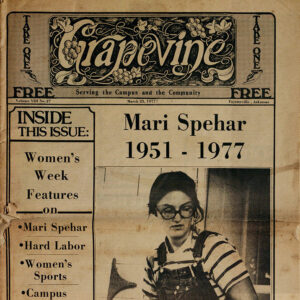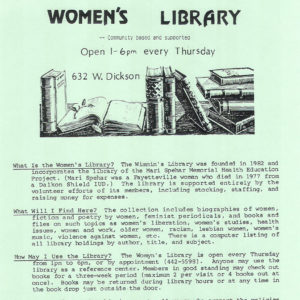calsfoundation@cals.org
Women's Library
The Women’s Library was formed in Fayetteville (Washington County) in 1982. Completely volunteer based and operated, the library lent books, musical recordings, and local and national periodicals that supported women’s rights and self-education. Many of these materials could not be found at Fayetteville’s public library or in local bookstores, and so the library was a central resource for early gender and women’s studies courses at the University of Arkansas (UA) in Fayetteville. The library sponsored special events like book and craft fairs, live music, and poetry readings in its space. In addition, it donated materials to women’s prisons and to the Women’s Project in Little Rock (Pulaski County). The library closed in 2000.
The Women’s Library was created by a group of women responding to an advertisement published in a local newspaper, the Grapevine. The ad was placed by members of the Mari Spehar Memorial Health Project, a community organization named for a Fayetteville woman who had died in 1977 from complications with a Dalkon Shield IUD birth-control device. The health project was aimed at educating women on their own health, and after the closing of its original space (the University of Arkansas–sponsored Women’s Center on Razorback Road), project members were interested in finding another organization to split the cost of their new rental space in the Watson Street Warehouse near downtown Fayetteville. Community women, including Diana Woodall and Beverly “Guthrie” Braunlich, formed the Women’s Library and moved into a shared space at 401 Watson Street in 1982.
After the dissolution of the Mari Spehar Project in 1983, the Women’s Library inherited the project’s collection of 300 books on “women’s self-health, birth control, pregnancy, childbirth, and the health care system.” Concurrently, the Women’s Library moved from the location on Watson Street to 632 West Dickson Street, in a section of venues then called “the boardwalk.” Braunlich’s word-processing business was among its neighbors. This benefited the organization, since resources from the business could be used to create advertisements and official documents for the library. The library relied heavily on funds raised through community fundraising events, including fairs and poetry readings, as well as direct-mail campaigns.
The library’s holdings expanded from 300 to more than 1,000 items by 1985. All materials came from donations contributed by the community or by publishing and recording companies that donated materials in exchange for written reviews of the works by library volunteers. Computerized records of the library’s holdings were created in 1988 by volunteers.
The library maintained limited operating hours due to its reliance on a volunteer staff. Anyone was welcome to use the library’s staff expertise and materials for reference work. However, only members could borrow materials. Members were defined as any woman who agreed with the policies of the library and paid a one-time registration fee of $5 for the first year of membership (this fee changed throughout the duration of the organization). While records describing these specific policies have not been located, outlines of membership regulations include the timely return of materials and the payment of late fees. Individuals making up the membership base tended to identify as lesbian.
Extended hours were set in 1992 when the library became an incorporated nonprofit. When the boardwalk building came under new ownership in 1993, the library relocated to 17 North Block Street off the historic Fayetteville downtown square. This was the last location of the Women’s Library, and in 1999, the library’s board members began looking for new leadership. Due to the pressure of outside commitments, “burnout,” the need for a new space, and the unwillingness of other members to assume leadership or increase their contribution of time to the library, the board resigned in 1999. By 2000, the decision was made by members to close the library, and in the same year, the bulk of the contents of its collections, somewhere around 4,000 items, was donated to the University of Arkansas Libraries’ Special Collections department.
For additional information:
Lord, Allyn, and Anna M. Zajicek. The History of the Contemporary Grassroots Women’s Movement in Northwest Arkansas, 1970–2000. Fayetteville: 2000.
Women’s Library Archives. Special Collections. University of Arkansas Libraries, Fayetteville, Arkansas.
Megan A. Massanelli
University of Arkansas Libraries
 Civil Rights and Social Change
Civil Rights and Social Change Grapevine
Grapevine  Women's Library Flyer
Women's Library Flyer 




Comments
No comments on this entry yet.